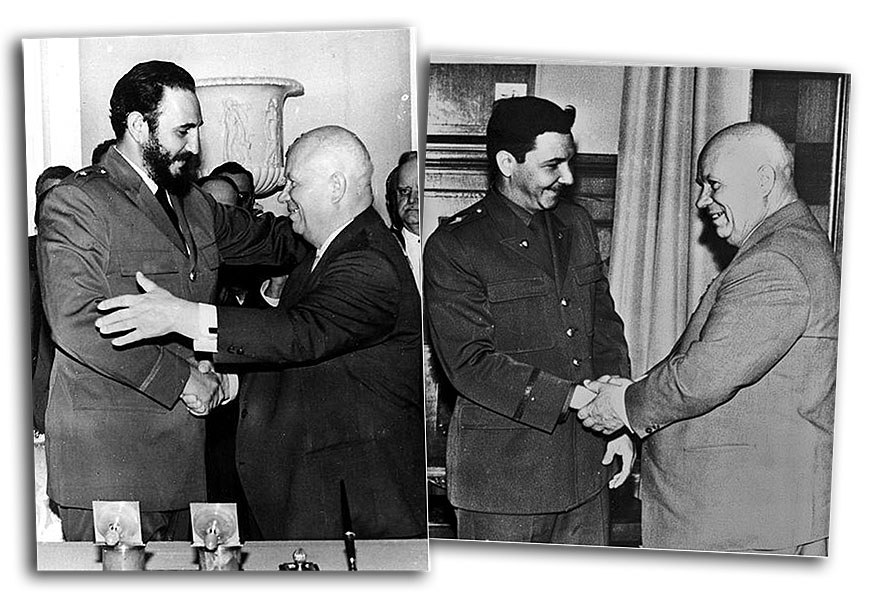The Archive’s CMC @ 60 Series Continues, FOIA Lawsuits Show Troubling Relationship between Retired U.S. Military Personnel and Authoritarian Regimes, and More: FRINFORMSUM 10/20/2022

The Archive’s Cuban Missile Crisis @ 60 Series Continues
The National Security Archive’s Cuban Missile Crisis @ 60 series continues with two new recent postings on 1) U.N. Ambassador Adlai Stevenson’s warning to President Kennedy to abandon his plan to attack Cuba, and 2) the first meeting between Nikita Khrushchev and Raul Castro.
Peter Kornbluh’s posting, How John F. Kennedy Sacrificed His Most Consequential Crisis Advisor, highlights a secret “eyes only” memorandum for John F. Kennedy, written 60 years ago from U.N. Ambassador Adlai Stevenson. In the memo, Stevenson admonished the president to abandon his initial plan to attack Cuba and to consider, instead, the diplomatic option of dismantling U.S. missile bases in Europe in return for the withdrawal of the Soviet missiles in Cuba. The memorandum, which was a follow-up to a private meeting Kennedy and Stevenson had on October 16 about the unfolding missile crisis, concluded with Stevenson’s mantra for U.S. diplomacy in the face of Soviet provocation: “Blackmail and intimidation never; negotiation and sanity always.” Read the entire posting here.
Svetlana Savranskaya’s posting, Getting to Know the Cubans: Khrushchev Meets the Castro Brothers, publishes – for the first time in any language – a translation of the first meeting between Soviet Premier Nikita Khrushchev and Cuban Defense Minister Raul Castro on July 18, 1960. The newly available transcript helps explain Khrushchev’s 1962 determination that defending Cuba from U.S. intervention would require a massive Soviet military base in Cuba, together with the deployment of nuclear weapons. Read the translation here.
The Archive’s CMC team also continues the daily updates in our document series, all of which can be found on our website. Recent updates include images of JFK’s Oval Office meetings with Soviets and U.S. U-2 pilots, Deputy Secretary of Defense Roswell Gilpatric’s note, “Alternative Courses of Action on Cuba,” and much more.
Sign Up
Want to stay on top of the latest FOIA news? Click here to sign up for our FRINFORMSUM (Freedom of Information Summary) email newsletter.
FOIA Suit Wins Release of Records on Retired U.S. Military Personnel Working for Foreign Governments
The Washington Post’s seven-part Foreign Servants series uses records obtained from a two-year Freedom of Information Act (FOIA) lawsuit to show how much retired U.S. military personnel have profited from going on to work for foreign governments – including those with deplorable human rights records. The series was only possible thanks to a September ruling by U.S. District Judge Amit P. Mehta, who ruled in favor of the Post and found the government’s argument that releasing the records would violate the former military personnel’s privacy “unconvincing”, resulting in the release of more than 4,000 pages of documents. Nate Jones, the Post’s FOIA coordinator and National Security Archive fellow, and investigative reporter Craig Whitlock, authored the remarkable series:
- “Father of American Navy” Helmed Russian Ship for Catherine the Great
- Retired U.S. Generals, Admirals Take Top Jobs with Saudi Crown Prince
- UAE Relied on Expertise of Retired U.S. Troops to Beef up its Military
- Former U.S. Navy Leaders Profited From Overlapping Interests on Sub Deal
- In Persian Gulf, A Lucrative Revolving Door for Retired U.S. Troops
- Key Findings From the Post’s Series on Veterans’ Lucrative Foreign Jobs
A complimentary FOIA lawsuit, filed by the Project on Government Oversight (POGO), highlights the State Department’s role in granting permission to the former U.S. military personnel to work for foreign interests. POGO’s own investigation shows that over half of the State Department-approved waivers allowed work with authoritarian governments. Read more on POGO’s website.
In Brief
- The Washington Post’s Editorial Board recently chided District Judge James E. Boasberg for his October 4 ruling in the Archive’s FOIA lawsuit against the CIA for a key Cold War document (that was already declassified by the State Department in its Foreign Relations of the United States series that is now, unfortunately, offline). The Editorial Board notes, “The Perroots memo and the FRUS volume offer vital history lessons about the difficulty of crisis management in the nuclear age — lessons we could use in this perilous time.”


Comments are closed.